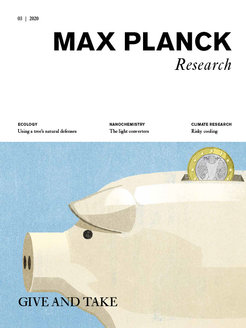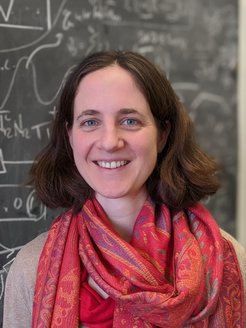Post from Rehovot, Israel
Interview with Minerva Fellow in MaxPlanckResearch science magazine
Dr. Elina Fuchs gives an insight in her personal experiences as an early career physicist during her years at the Weizmann Institute of Science in Israel

Each year young German and Israeli scientists get the opportunity to visit the respective other country with a Minerva Fellowship. From 2018 to 2019 Dr. Elina Fuchs had been one of a dozen early career researchers from Germany who collected important scientific experiences in Israel due to their Minerva Fellowship.
Not only did she profit from the excellent scientific basic research at the Weizmann Institute in Rehovot. Together with her husband, who also held a position at the Weizmann Institute, they even became parents during their time in Rehovot. This might be challenging for a young family being far away from their home country. But Fuchs took the advantage of her residence in a family-friendly environment: "We benefited from flexible working hours, working from home and the Institute kindergarten. We were also offered help by individual colleagues. One Weizmann employee gave us huge quantities of baby clothes. And when our daughter was born, two colleagues brought home-made food to our door."
But also when being asked about some of the advantages she had experienced in the Israeli scientific community, she swoons: "For researchers, Israel is a paradise for a number of different reasons. The laboratories and the infrastructure are phenomenal, and there are plenty of opportunities for networking as well." She also highlights the highly collaborative and supportive atmosphere at the Weizmann Institute. The Minerva Alumna is particularly interested in how the properties of the Higgs boson change in new models; she also worked with her colleagues at the Weizmann Institute on a new theory framework that had been proposed just right before her arrival in Israel and presented strategies for searches for the predicted new particle of this framework. For instance did she contribute in a paper about the phenomenology of relaxion-Higgs mixing. Over those four years she even got involved in the development of a new method at the interface between particle and atomic physics, something which she still moves forward and has started new collaborations about.
Read the full interview about her time in Israel as a Minerva Fellow in the MaxPlanckResearch science magazine.
About Elina Fuchs

Elina Fuchs studied physics in Goettingen and Helsinki. For her Masters thesis, she switched to DESY in Hamburg, where she also gained her doctorate from 2012 to 2015. Since then, she has conducted research into theoretical particle physics beyond the Standard Model. With the support of the Minerva Stiftung and the Weizmann Institute of Science she worked as a postdoc in Israel from 2015 to 2019. Since 2019 Fuchs has been continuing her research work at the Fermilab and the University of Chicago as a Feodor-Lynen fellow.
She is currently applying for a Max Planck Research Group of the Max Planck Society.
About the Minerva Fellowship Programme
The Minerva Fellowship Programme enables Israeli and German scientists to complete a research residency at institutions in the respective other country. Minerva Fellowships are not only intended to promote research but also to strengthen the cultural and scientific exchange between Germany and Israel. Younger scientists (graduates and post docs) get the possibility to further their scientific background while they conduct a research project at their host institution in Israel or Germany. The Minerva Fellowship Programme is being funded by the German Federal Ministry for Education and Research. To date, more than 1800 Minerva Fellowships have been awarded to German and Israeli researchers since the start of the programme in 1973.




